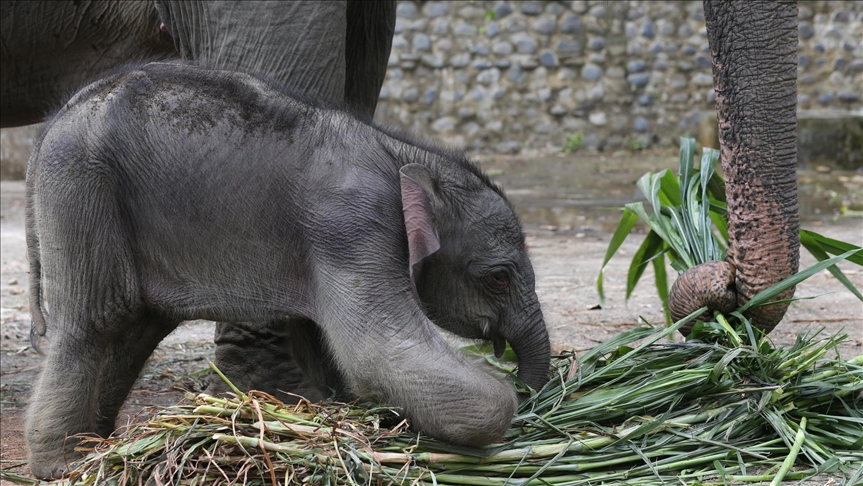Sumatran elephant gives birth amid fatal virus threat
EEHV infection can be a fatal, affects mainly young elephants
 An elephant calf eats sugarcane grass with her mom in Tangkahan Sumatran Elephant Special Animal Training Center in North Sumatra, Indonesia on February 4, 2021. The calf was born from a female elephant named Sari on Monday. ( Kiki Cahyadi - Anadolu Agency )
An elephant calf eats sugarcane grass with her mom in Tangkahan Sumatran Elephant Special Animal Training Center in North Sumatra, Indonesia on February 4, 2021. The calf was born from a female elephant named Sari on Monday. ( Kiki Cahyadi - Anadolu Agency )
MEDAN, Indonesia
A critically endangered Sumatran elephant gave birth Monday to a calf at the Tangkahan Resort Special Animal Training Center of Mount Leuser National Park (TNGL Center).
The female calf was born from its 35-year old mother, Sari, and was found by a mahout.
Sari gave birth without medical assistance. Shortly after giving birth, Sari consumed its placenta to obtain postpartum benefits.
Jefry Susyafrianto, the center's head, said officers would monitor the elephant calf and its mother.
"Thankfully, the calf and the mother are healthy," Jefry told Anadolu Agency.
The calf weighs 69 kilograms (152 pounds), stands 108 centimeters tall (43 inches), with a 90-centimeter (35-inch) bust line, said Jefry.
The TNGL Center warmly welcomed the calf's presence despite concerns about the emergence of a lethal Elephant Endotheliotropic Herpesvirus (EEHV) infection.
EEHV is one of the most fatal, infectious elephant diseases worldwide, killing many young elephants aged one year to 5 years.
A few years ago, Sari gave birth to two calves, but they died after contracting EEHV.
"One of them died in 2013, while the other died in 2015. We are doing everything possible to prevent this from happening again," said Jefry.
Muhammad Wahyu, founder of the Veterinary Society for Sumatran Wildlife Conservation (Vesswic), confirmed that Sari and the newborn elephant are both healthy.
Vesswic is a non-governmental organization that provides supplies, drugs, and logistics for elephants at the training center.
Three baby elephants die of 'lethal' herpes strain
Since 2013, the Tangkahan Resort Special Animal Training Center has cared for three generations of elephants.
Three calves were born in the first generation but died after contracting EEHV1A, the most common EEHV type.
Meanwhile, three elephants -- Christ, Albertina, and Europa -- were born in the second generation.
However, a few years ago, Europa caught a disease with EEHV-like symptoms and recovered later.
"The laboratory results showed it has tested positive with EEHV, but we could not confirm which type," said Wahyu.
He explained that there are seven sub-types of EEHV; some are deadly, while others are not.
To date, there is no cure for herpes viruses in animals or humans. Current treatments suppress EEHV and elephants can potentially recover if treatment starts early.
Elephant tourism
Tangkahan, a home of Sumatran elephants, is widely known as a hidden paradise of Mount Leuser National Park.
With stunning river and jungle views, Tangkahan attracts local and foreign tourists.
Currently, the Tangkahan Resort Special Animal Training Center takes care of nine captive wild elephants. The oldest, about 40, is called Theo.
There are 11 elephant handlers, often known as mahouts, in the center responsible for feeding, cleaning or bathing, and treating minor medical conditions and training.
The center provides 200 kilograms (152 pounds) of food per day for each elephant.
"We usually feed them with oil-palm fronds, Napier grass, bananas and papayas," said Jefry.
Sumatran elephants are a protected species under Law No. 5/1990 on Sustainable Natural Resources and Ecosystem Conservation.
The regulation prohibits any form of hunting, trading, or the animal's possession or parts. Punishment is a fine of IDR200 million ($14,244) or a prison term of at least five years.
Sumatrans elephants are listed as "critically endangered" on the International Union for Conservation of Nature (IUCN) Red List.
Based on 2017 data, there are an estimated 2,000 elephants spread across seven provinces on Sumatra Island, namely Aceh, North Sumatra, Riau, Jambi, South Sumatra, Bengkulu and Lampung.
*Writing by Maria Elisa Hospita
Anadolu Agency website contains only a portion of the news stories offered to subscribers in the AA News Broadcasting System (HAS), and in summarized form. Please contact us for subscription options.

